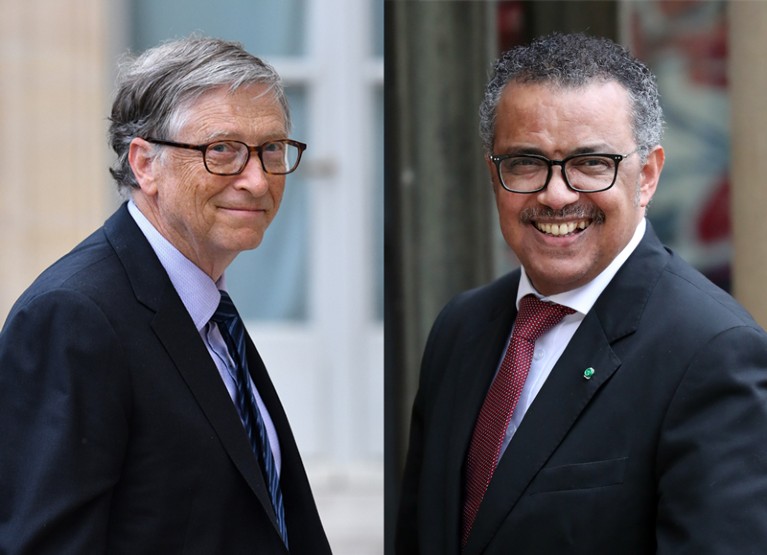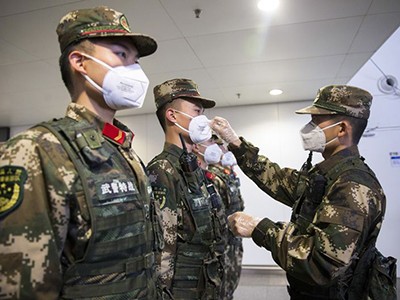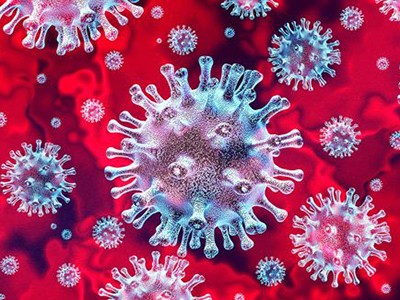
Philanthropist Bill Gates (left) has pledged $100 million for coronavirus-response efforts. Tedros Adhanom Ghebreyesus (right), director-general of the World Health Organization, is calling for urgent support to bolster weak health systems.Credit: Mustafa Yalcin/Anadolu Agency/Getty
As the 2019 novel coronavirus continues its deadly rampage, the World Health Organization (WHO) is rightly drawing attention to the risks the virus poses to the poorest and most vulnerable nations — particularly in Africa.
As Nature went to press, more than 43,000 infections and more than 1,000 deaths had been confirmed. Soon, thousands of China’s citizens will be returning to their jobs on the African continent after an extended new-year holiday. If the virus also reaches Africa, it could spread rapidly and undetected because health systems in many regions are too fragile and underfunded to cope.
As a result, the WHO has scrambled to equip 14 countries — including the Democratic Republic of the Congo, Ethiopia and Nigeria — with diagnostics, expertise and equipment to detect and contain the virus. The agency has also appealed for US$675 million to assist vulnerable countries — an amount that it estimates will last only until the end of April.
And yet, as donors start to provide emergency aid — the Bill & Melinda Gates Foundation was among the first with a $100-million pledge — it’s hard to avoid the feeling of déjà vu. Infectious-disease outbreaks are often accompanied by such pledges to improve disease surveillance, and by promises to provide funds for drug and vaccine development. What is less forthcoming is sustainable funding for clinics providing community-level general medicine, and for medical and nursing education, as well as investments to sustain hospitals with supplies, electricity and running water.
Latest news on the coronavirus
These are all steps that would help countries to combat infectious diseases and improve overall public health — as WHO director-general Tedros Adhanom Ghebreyesus urged in a statement at the end of last month. Seven of the nations that the WHO will be helping scarcely have one nurse per 1,000 people, according to the most recent statistics from the World Bank. And more than 50% of the continent’s 1.2 billion inhabitants lack access to essential primary care.
To be fair, a shift in outlook has already begun. In 2016, the World Bank and the Global Fund to Fight AIDS, Tuberculosis and Malaria committed $24 billion over three to five years for universal health care in Africa. And over the past year, Rwanda’s president, Paul Kagame, has been leading an African Union task force with the explicit aim of achieving measurable universal health coverage in all of its 55 member states, partly by committing to spending 5% of gross domestic product on health care. This is an ambitious aim, and it needs to be. “Governments should surely be willing and able to increase domestic investment in healthcare,” Kagame said as the project got under way.
A temporary surge of assistance aimed at infectious-disease surveillance — as is happening now — might suffice in places where health systems are reasonably robust. But for the poorest countries with the weakest systems, even the best projects will struggle once these grants come to an end, as the case of Ebola shows all too well.
After the world’s biggest Ebola outbreak ended in 2016, donors, including the US government and the World Bank, put more than $100 million into initiatives to strengthen health and disease-surveillance systems in the three countries that were worst hit — Liberia, Sierra Leone and Guinea.
Nature Collection: Coronavirus
But many of these initiatives are ending and health care is showing signs of erosion. Since last summer, protests have been erupting in Liberia as the economy and the national health system have crumbled. Major hospitals are reported to lack life-saving drugs, and health workers and lab technicians say they have not been paid for months. Patients have been turned away from clinics empty-handed, meaning that someone infected with coronavirus might not bother going to a clinic — or, if they did, could be sent back home. This problem isn’t specific to Liberia. In many of the poorest countries, staff in national health systems barely earn a living.
International donors have sound reasons for not providing long-term funding for certain facets of basic public health — such as salaries for government employees. Arguably, one of their biggest fears is that in doing so they would become too deeply involved in the workings of national government departments, which are often complicated organizations to navigate. Another worry is that donors could be perceived as telling sovereign governments what to do. Instead, many international donors reduce their direct involvement with a nation’s public sector by funnelling their assistance through large, non-governmental institutions such as charitable aid agencies. But when this happens, national health systems remain weak.
Clearly, finding solutions to these problems will not be easy, but avoidance is no longer an acceptable option — especially now that the African Union and the WHO are taking steps to prioritize universal health coverage. Donors must consider how their initiatives can help to strengthen national health systems in the long term. For example, they could ensure that the health workers being trained to handle patients suspected of having coronavirus are still employed at hospitals five years later. This might not seem like a priority in the middle of an emergency, but it will pay off handsomely down the line.
The march of the coronavirus reminds us yet again that world leaders and philanthropic donors pay attention to epidemics only when an infection is on their doorsteps. They must recognize that the time to think about the next epidemic is now.

 Latest news on the coronavirus
Latest news on the coronavirus
 Calling all coronavirus researchers: keep sharing, stay open
Calling all coronavirus researchers: keep sharing, stay open
 Africa should set its own health research agenda
Africa should set its own health research agenda
 How Africa can quell the next disease outbreaks
How Africa can quell the next disease outbreaks






